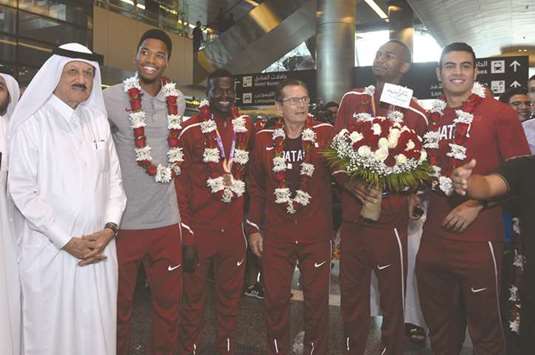So when the high jumper walks out into the arrivals hall at Doha’s Hamad International Airport, he soaks in the adulation, waves at the cameras, greets the officials who have gathered to welcome him, and sports a wide smile while he does it all.
And yet all he wanted to do in that moment was get back home and sleep in his own bed. “I haven’t done that in more than five months,” he says.
But before that, he reflects on a season where he hasn’t lost any competition he has participated in. Specifically, on the London World Championships, where he won his first outdoors world title last month.
“It was a great experience, great atmosphere. It is the biggest competition in track and field. Of course, there are Olympic Games, but only track and field it is the biggest event out there. The stadium was full, high pressure, high quality of field across disciplines… So you just need to stay focused and the get the job done,” he says.
The 26-year-old speaks volumes about the pressure factor. It pushes most great athletes, it pushes him.
“There is always pressure. But this pressure is to do better. It’s a different kind of pressure, not like you don’t have a place to sleep, or food to eat. That’s the kind of pressure that will break you down. But pressure in sport, you can deal with it. If you channel it right and you can feed off that energy in performances,” he says.
At London, even after he had won the title ahead of Danil Lysenko and Syria’s Majd Eddin Ghazal, and in subsequent attempts at Diamond League events in Birmingham and Zurich, Barshim kept on going in the quest for Javier Sotomayor’s 2.45m world record, one of the longest standing records in athletics.
And while he touched 2.40m twice this season — in Birmingham and Eberstadt — he is satisfied with his season.
“2.40m in a championship season is good. What counts are the medals and the titles this year. You get the titles, and then you have the rest of the season and other seasons to go for the records. Next season, we have the world indoors in March, and so my next aim is that. But I don’t think there are any major championships in summer, and that’s when you can focus on records and individual goals,” he says.
At just 26, his coach Stanislaw Szczyrba feels Barshim will only progress further. “The best age for a high jumper is 28, 29, 30. So he is on his way to the top. He is physically and mentally stronger now,” the Polish/Swedish coach says.
With so many expectations, how does one hope to better an unbeaten season next time round?
“Of course there is pressure (to better this season next year). But what’s also true is that I add pressure on myself. I don’t wait for anyone else to do that. It’s not as if I am in this sport because I must or someone is putting pressure on me. I am here because I love doing what I do. It is my choice. I always expect better from myself every time I walk out on the field,” the Qatari says.
So there’s pressure that Barshim feeds off, and then there is a competitive field. While he soaked in all the pressure, some of his biggest rivals, the likes of Ivan Ukhov, Bohdan Bondarenko, Gianmarco Tamberi, were absent from the big stage.
“It (a good field) is not a need, but it’s better if you have a strong field. I perform best when I am under pressure. That’s when you are pumped enough to get higher level performances, higher jumps. Competitiveness pushes good athletes. But it’s not a must,” he says.
But what’s a must for the star athlete is his time off. “I have a month off and then we start preparing again for the next competition in January. It’s been a long season and I need to give my body some time to recover,” he says.
And then, the ‘Pride’ of Qatar is off to oblige the next lot of people for photographs. Arms around their shoulders, smile, et al.

